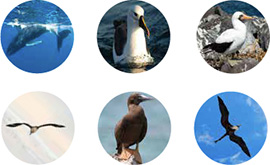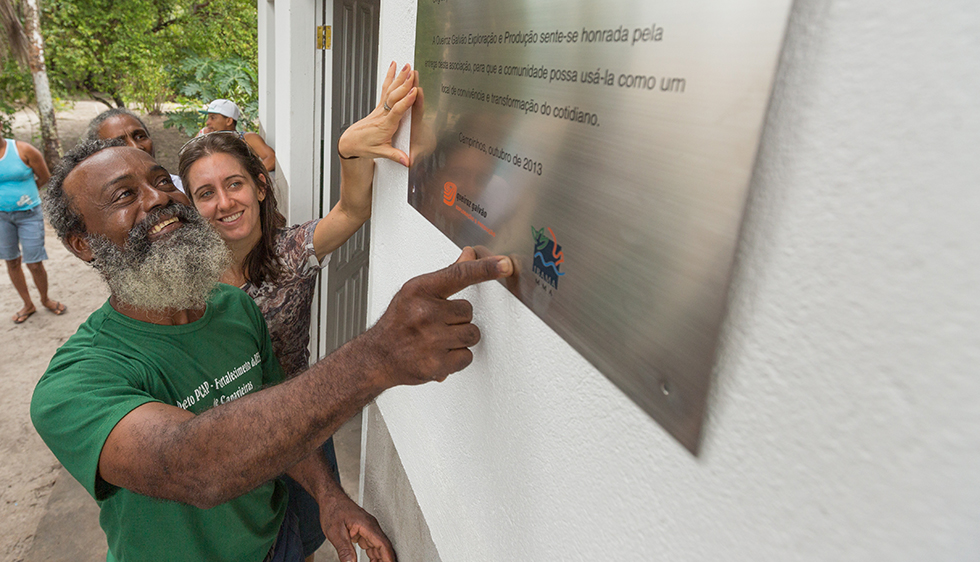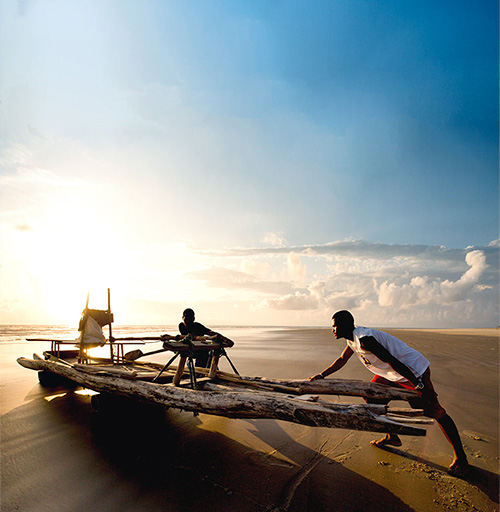Before beginning its exploration and production activities in areas where it is an operator, QGEP is legally bound to draft environmental impact studies and implement measures for mitigation or environmental compensation of the impacts on local biodiversity. These studies already include the Activity Deactivation Project, with actions to be executed after operations end. The Company has not yet executed the exit plan in any of its projects. GRI G4-EN11Global Compact 8
| NUMBER OF SPECIES BY LEVEL OF EXTINCTION RISK (IUCN) | BM-J-2 | BS-4 | ||||||
|---|---|---|---|---|---|---|---|---|
| Turtles | Birds | Fish | Marine mammals | Turtles | Birds | Fish | Marine mammals | |
| Data deficient | 0 | 1 | 1 | 0 | 0 | 6 | 6 | 16 |
| Near threatened | 0 | 2 | 0 | 2 | 0 | 4 | 9 | 0 |
| Vulnerable | 2 | 2 | 1 | 0 | 2 | 6 | 13 | 2 |
| Endangered | 2 | 0 | 0 | 1 | 2 | 3 | 8 | 3 |
| Critically endangered |
1 | 0 | 0 | 0 | 1 | 1 | 3 | 1 |
| BM-J-2 | BS-4 | |
| Humpback whale (megaptera novaeangliae): least concern | Atlantic yellow-nosed albatross (thalassarche chlororhynchos): endangered | |
| Masked booby (sula dactylatra): least concern | South polar skua (stercorarius maccormicki): least concern | |
| Brown booby (sula leucogaster): least concern | Magnificent frigatebird (fregata magnificens): least concern |

Projects related to protecting biodiversity are developed by QGEP in Block BM-J-2, which covers 371 square kilometers and exerts influence on an area including the municipalities of Ilhéus, Una, Canavieiras and Belmonte (Bahia). This region is part of the Canavieiras Marine Extraction Reserve and is near the Descobrimento, Marinho dos Abrolhos, Pau Brasil and Monte Pascoal National Parks. In the case of BM-J-2, according to the license, activities in this region may only occur outside of the restriction period in the area due to the occurrence of turtles and of lower probabilities of a possible leak, in the case of an incident, which in the worst case could affect the Abrolhos area.
GRI G4-EN12Global Compact 8The Fishing Compensation Plan (PCAP) projects developed in the communities the BM-J-2 area of influence were finalized by QGEP in 2013. The results were presented during various meetings with local representatives. The only project which has yet to be finalized is construction of an indigenous and fishing community center in Acuípe, since the Company is awaiting conclusion of an assessment by the National Indian Foundation (Fundação Nacional do Índio – Funai), since construction is planned on indigenous land.
In other locations, QGEP has delivered salvage equipment and has replaced wooden fishing boats with carbon fiber boats, making navigation safer. Community centers were also delivered, according to the plan made with each of the 20 communities in the area of influence of the activity. PCAP investments were geared towards maritime safety initiatives and development of infrastructure for fishing vessels.
In the Extractivist Reserve (Resex), the Company has contributed to strengthening the Region, while also contributing to a culture of safety at sea, by providing shipping equipment, fostering management of projects and training extractives.

| COMMUNITIES OF ILHÉUS | Fishing Compensation Plan Deliveries |
|---|---|
| Acuípe | Construction of Amipab center – awaiting conclusion of assessment by Fundação Nacional do Índio (Funai) |
| Sede de Ilhéus/Barra de Itaípe | Donation of technological nautical equipment or highest encumbrance required by law, according to local fleet's demand; and execution of a mini-course on the use of this technological equipment |
| Cururupe | Replacement of a dinghy with a motorized carbon fiber fishing boat that has a nautical equipment kit |
| Olivença and Ponta do Ramo | Replacement of the fishing boat fleet and refurbishment of wooden boats, giving both nautical equipment kits |
| Ponta da Tulha e Ponta do Mamoã | Refurbishment of the dinghy fishing, equipping it with nautical equipment kits |
| São Miguel | Acquisition of the Apesmar center |
| EXTRACTIVIST RESERVE (RESEX) COMMUNITIES | Fishing Compensation Plan Deliveries |
|---|---|
| Association of Mothers of Resex Extractivists of Canavieiras (Associação Mãe dos Extrativistas da Resex de Canavieiras – Amex) | Management, training, operationalization, technical advising and accounting for the PCAP |
| Association of Fishermen and Extractivists of Barra Velha (Associação dos Pescadores e Extrativistas da Barra Velha – Apembav) | Acquisition of materials to remodel and expand its headquarters |
| Association of Farmers, Residents and Fishermen of Puxim da Praia (Associação dos Agricultores, Moradores e Pescadores do Puxim da Praia – AMAPPP) | Acquisition of materials to remodel its headquarters |
| Association of Fishermen and Shellfish Collectors of Pedras de Uma (Associação dos Pescadores e Marisqueiras de Pedras de Uma – APMU) | Acquisition of materials to remodel and improve its headquarters |
| Association of Fishermen and Farmers of Campinhos (Associação dos Pescadores e Agricultores dos Campinhos – APAC) | Acquisition of materials to build its headquarters |
| Association of Shellfish Collectors of Belmonte (Associação das Marisqueiras de Belmonte – APB) | Acquisition of land and material to build a social center |
| Association of Fishermen and Shellfish Collectors of Oiticica (Associação dos Pescadores e Marisqueiras de Oiticica – APMO) | Acquisition of materials to expand the APPS – Associação dos Pescadores e de Puxim do Sul headquarters, buy land, purchase of materials to build headquarters |
| Association of Crab Fishers of Canavieiras (Associação dos Tiradores e Catadeiras de Caranguejo de Canavieiras – ATCC) | Purchase of land, acquisition of materials to build its headquarters |
| Association of Fishermen, Shellfish Collectors and Residents of the Community of Atalaia (Associação dos Pescadores, Marisqueiras e Moradores da Comunidade da Atalaia – APEMA) | Acquisition of materials to remodel and expand its kitchen |
| Z-21 Colony of Belmonte Fishermen | Acquisition of materials to build a social center and labor |
| Z-20 Colony of Canavieiras Fishermen | Equipment for a VHF radio base |
| Association of Fishermen of Belmonte (Associação dos Pescadores de Belmonte – APB) | Remodel of ice factory |
| Community of Mojiquiçaba | Acquisition of vessels for shellfish collectors and fishermen of Mojiquiçaba |
| Association of Shrimp Fishers of Canavieiras (Associação dos Pescadores e Catadeiras de Camarão de Canavieiras – APESCC) | Salvage equipment to regularize vessels |

The Beach Monitoring Project (PMP) implemented for Block BM-J-2 executed monitoring of the beaches along the shorelines of the municipalities of Ilhéus, Una and Canavieiras, in order to verify the presence of beached animals before, during, and after execution of drilling activity. Stretches covered daily were Olivença, Acuípe, Itapororoca, Comandatuba Norte, Comandatuba Sul, Barra Velha, Ilha do Brinquinho, and Ilha do Atalaia.
The project’s second initiative began in the first quarter and covered 41,666 kilometers, totaling 81,636 kilometers – including the distance covered in the first campaign held in 2011. After drilling activity ended in 2011, QGEP maintained the animal service base running without interruption in Olivença, as well as a rescue team and communication initiatives to publicize the phone number to call if beached animals were found.
In April 2013, with drilling planned to start up again in June, QGEP reinitiated daily monitoring stretches of beach. Monitoring ended in December 2013 and, in both campaigns, the following were brought to the base:
Notable among the animals rescued are one leatherback sea turtle, one South American fur seal, and one subantarctic fur seal.
The Fisheries Catch Monitoring Project (PMDP) is aimed at assessing the influence of drilling activity on local fishing activity, through analysis of fish catch data. For this reason, local monitors have been trained to collect primary data from the main fisheries in the region.
QGEP has maintained the PMDP without interruption since April 2011. It has therefore been able to gather a solid database on fishing capture and efforts, enabling assessment of variations in productivity. In 2014, a final report will be submitted to Ibama.